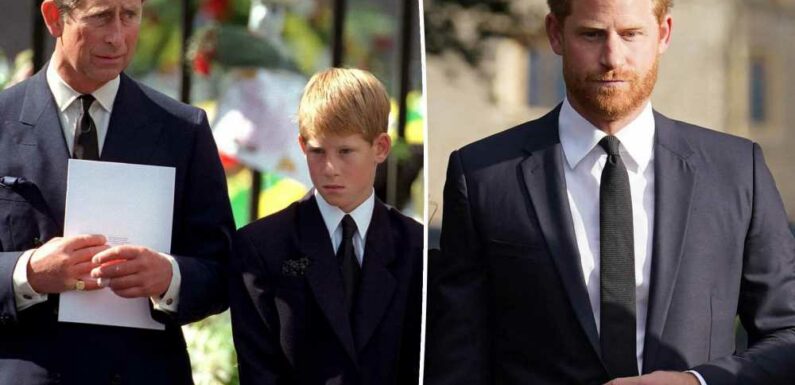
More On:
prince harry 'spare' book
Queen’s opinion of tequila-loving Chelsy Davy played role in Prince Harry breakup
Prince Harry claims Prince William ‘recoiled’ from Meghan Markle’s hug
Prince Harry once believed Diana faked her own death to escape press
‘Tormented’ Prince William felt ‘guilt’ over Charles’ affair: Prince Harry
Prince Harry’s father, King Charles III, blamed himself for his son’s mental health struggles after he returned home from the Afghanistan war.
In his bombshell memoir, “Spare,” Harry recalled a conversation with his father from the early 2010s, where the now-King lamented not getting his youngest son mental health help.
“Speaking with my father one night at Highgrove, we spoke at length about what I had been dealing with,” the 38-year-old father of two wrote.
“I gave him all the details and shared one anecdote after another. Toward the end of his meal, he lowered his head and said, ‘I suppose it’s my fault. I should have gotten you the help you needed years ago.’”
Harry, who left the Royal Family with his wife Meghan Markle in 2020, told his dad it “wasn’t his fault.”
“But I appreciated the apology,” he added.
Harry’s mental health spiral began in 2013 when he returned home from Afghanistan. He also realized then how his mother’s death had affected him.
“I was desperate to find a cause, a treatment. In fact, I spoke with my father. I was very sincere: ‘Dad, I’m having a very hard time with panic and anxiety attacks,’” he wrote.
“He sent me to a doctor, which was a very kind gesture on his part, but it was a general doctor without any new ideas. He wanted to prescribe me pills. I did not want to take pills.”
Harry “exhausted all other remedies, including homeopathic ones” and eventually turned to magnesium.
“In large quantities, it had many negative side effects – like laxatives – which I found out the hard way at the wedding of a friend,” he quipped.
Harry described his symptoms as “alternating between periods of extremely debilitating lethargy and terrifying panic attacks.”
“My official life consisted of going out in public, engaging in discussions, debates and giving interviews, and suddenly I found myself almost incapable of doing these basic functions,” he explained.
“It never occurred to me that I could also be suffering from PTSD. Aside from all of my work with injured soldiers, all of my efforts to help them … I never realized that I myself was an injured soldier.
“And my war had not started in Afghanistan. It started in August of 1997.”
Elsewhere in the memoir, Harry reflected on his mother’s death and how his father treated him in the wake of the family’s devastating loss.
“Pa didn’t hug me. He wasn’t great at showing emotions under normal circumstances, how could he be expected to show them in such a crisis?” he wrote.
“His hand did fall once more on my knee and he said, ‘It’s going to be OK.’ That was quite a lot for him. Fatherly, hopeful, kind. And so very untrue.”
Harry went on to detail the conversation he had with Charles when he learned the tragic news.
“[Dad] sat down on the edge of the bed. He put a hand on my knee. ‘Darling boy, Mummy’s been in a car crash,’” Harry recalled.
“I remember thinking: Crash … OK. But she’s all right? Yes? I vividly remember that thought flashing through my mind. And I remember waiting patiently for Pa to confirm that indeed Mummy was all right. And I remember him not doing that.”
“Spare” will be available at bookstores in the U.S. on Jan. 10.
Share this article:
Source: Read Full Article




